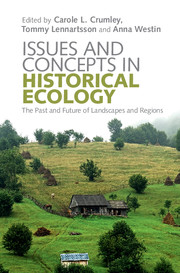Crossref Citations
This Book has been
cited by the following publications. This list is generated based on data provided by Crossref.
Wallman, Diane
Wells, E. Christian
and
Rivera-Collazo, Isabel C.
2018.
The Environmental Legacies of Colonialism in the Northern Neotropics: Introduction to the Special Issue.
Environmental Archaeology,
Vol. 23,
Issue. 1,
p.
1.
Farahani, Alan
2018.
A 2500-year historical ecology of agricultural production under empire in Dhiban, Jordan.
Journal of Anthropological Archaeology,
Vol. 52,
Issue. ,
p.
137.
Balée, William
2018.
Brief Review of Historical Ecology.
Les Nouvelles de l'archéologie,
p.
7.
Bracco Boksar, Roberto
Duarte, Christopher
Gutiérrez, Ofelia
Tassano, Marcos
Norbis, Walter
and
Panario, Daniel
2020.
El fuego en los procesos constructivos de los montículos del sur de la cuenca de la Laguna Merín (Uruguay): Un aporte de la datación por luminiscencia (OSL/TL).
Latin American Antiquity,
Vol. 31,
Issue. 3,
p.
498.
Opitz, Rachel
Strawhacker, Colleen
Buckland, Philip
Cothren, Jackson
Dawson, Tom
Dugmore, Andrew
Hambrecht, George
Koster, Willem
Lethbridge, Emily
Mainland, Ingrid
McGovern, Tom
Newton, Anthony
Palsson, Gisli
Ryan, Tom
Streeter, Richard
Stade, Elisabeth
Szabo, Vicki
and
Thompson, Polly
2021.
A Lockpick's Guide to dataARC: Designing Infrastructures and Building Communities to Enable Transdisciplinary Research.
Internet Archaeology,
Ceddia, M. Graziano
Montani, Rodrigo
and
Mioni, Walter
2022.
The dialectics of capital: learning from Gran Chaco.
Sustainability Science,
Vol. 17,
Issue. 6,
p.
2347.
Iordachescu, George
2022.
Convivial Conservation Prospects in Europe—From Wilderness Protection to Reclaiming the Commons.
Conservation and Society,
Vol. 20,
Issue. 2,
p.
156.
Pandey, Rajanikant
2022.
Reflections on ecological and biological theories in anthropology.
International journal of health sciences,
p.
4099.
Blanchard, Grégoire
and
Munoz, François
2022.
Historical Ecology.
p.
273.
Nogueira, João Francisco Miró Medeiros
de Carvalho, Alessandra Izabel
and
Nimmo, Evelyn Roberta
2023.
Historical Ecology and Landscape Archaeology in Lowland South America.
p.
133.





